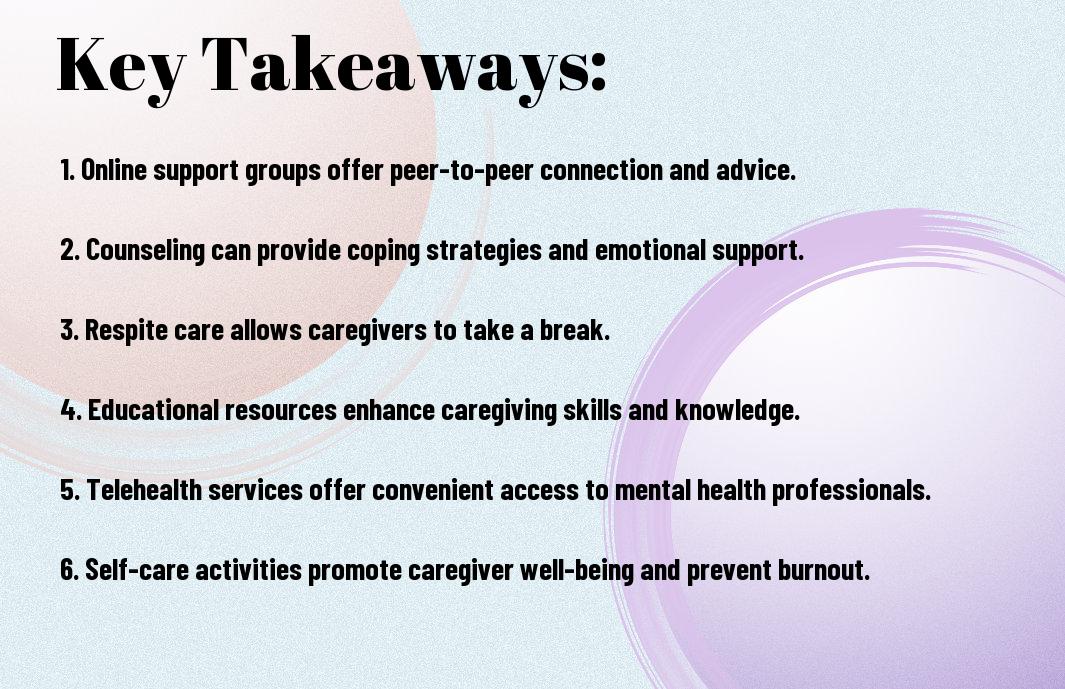Overwhelmed by the challenges of caregiving at home? You’re not alone. In this informative post, we explore the best mental health resources available for home caregivers. With compassion and understanding, we highlight tools and support systems that can help caregivers navigate their journey with resilience and self-care. Let’s dive in and discover the resources that can provide comfort and guidance during this time. Note, taking care of yourself is important in order to care for others effectively.

Key Takeaways:
- Self-care is crucial: Home caregivers must prioritize their own mental health and well-being to effectively support their loved ones.
- Support groups and online communities: Joining support groups or online communities can provide caregivers with a sense of belonging and understanding.
- Professional counseling: Seeking help from therapists or counselors can offer valuable coping strategies and emotional support for caregivers.
- Respite care services: Taking breaks and utilizing respite care services can prevent burnout and allow caregivers to recharge.
- Education and training: Participating in education and training programs can equip caregivers with the necessary skills and knowledge to provide better care and manage stress effectively.

Identifying the Challenges of Home Caregiving
The Mental Health Home Care services are crucial for home caregivers facing a myriad of challenges in their role. One of the significant challenges faced by home caregivers is the emotional burden and the risk of burnout associated with it.
Emotional Burden and Burnout
Any caregiver can attest to the emotional toll that comes with caring for a loved one. The constant worry, stress, and guilt can take a significant toll on one’s mental health. Caregivers often find themselves juggling multiple responsibilities, leaving little to no time for self-care. This can lead to burnout, a state of emotional, mental, and physical exhaustion that can have detrimental effects on both the caregiver and the care recipient.
Social Isolation and Lack of Support can exacerbate the emotional burden experienced by home caregivers. Isolation can make caregivers feel alone in their struggles, leading to feelings of loneliness and despair. Lack of support from family, friends, or the community can further compound these feelings, leaving caregivers feeling overwhelmed and unsupported.
Social Isolation and Lack of Support
Isolation and lack of support are common challenges faced by home caregivers. The nature of caregiving often requires caregivers to sacrifice social activities and relationships to meet the needs of their loved ones. This can lead to feelings of loneliness and isolation, as caregivers may struggle to find time for themselves or to connect with others who understand their experiences.
Understanding the impact of social isolation and lack of support is crucial in providing adequate resources for home caregivers. By recognizing these challenges, caregivers can seek out support groups, counseling services, or respite care to help alleviate feelings of isolation and create a more sustainable caregiving environment. It’s important for caregivers to prioritize their mental health and well-being to provide the best care for their loved ones.
Essential Mental Health Resources for Home Caregivers
Online Therapy Platforms and Hotlines
One of the necessary mental health resources for home caregivers is access to online therapy platforms and hotlines. These platforms offer convenient and confidential ways to seek professional help and support. Caregivers can connect with licensed therapists through video calls, phone calls, or messaging, making it easier to fit therapy sessions into their busy schedules. Hotlines are also available for immediate support in times of crisis or when caregivers need someone to talk to urgently.
Online therapy platforms can provide caregivers with coping strategies, tools to manage stress and burnout, and a safe space to express their feelings and concerns. Additionally, hotlines offer a lifeline for caregivers who may feel overwhelmed or isolated in their caregiving roles. By utilizing these resources, home caregivers can prioritize their mental health and well-being while caring for their loved ones.
These platforms and hotlines are crucial for caregivers who may not have the time or flexibility to attend in-person therapy sessions. They offer a convenient and accessible way to receive support and guidance from mental health professionals, helping caregivers navigate the challenges and emotions that come with their responsibilities.
Support Groups and Forums
Caregivers can also benefit greatly from engaging in support groups and forums specifically designed for individuals in similar caregiving roles. These spaces provide a sense of community, understanding, and validation that can be incredibly comforting for caregivers facing similar challenges. Sharing experiences, advice, and resources with others who can relate can reduce feelings of isolation and offer a support network for caregivers.
The connections formed in support groups and forums can be a source of strength and encouragement for caregivers, reminding them that they are not alone in their struggles. In these settings, caregivers can freely express their emotions, ask for help, and receive valuable insights from peers who truly understand the complexities of caregiving.
The camaraderie and mutual support found in support groups and forums can help home caregivers navigate their roles with greater resilience and emotional well-being. These resources play a vital role in combating caregiver burnout and promoting mental health among individuals caring for loved ones.
Building a Self-Care Toolkit
Mindfulness and Meditation Practices
Keep in mind that caring for a loved one can be emotionally taxing, and it’s important to prioritize your own mental well-being. With that in mind, incorporating mindfulness and meditation practices into your daily routine can help alleviate stress and promote a sense of calm. Taking just a few minutes each day to focus on your breath and be present in the moment can make a significant difference in your overall mental health.
Start by finding a quiet space where you can sit comfortably and close your eyes. Take slow, deep breaths, focusing on the sensation of air entering and leaving your body. Allow any thoughts or distractions to pass without judgment, bringing your attention back to your breath each time. There are many guided meditation apps and videos available online to help you get started if you’re new to the practice.
By incorporating mindfulness and meditation into your self-care toolkit, you can cultivate a sense of inner peace and resilience that will support you in your role as a home caregiver.
Journaling and Creative Expression
Creative expression can be a powerful tool for processing and expressing complex emotions that arise as a home caregiver. Whether it’s through journaling, painting, music, or any other form of creative outlet, finding a way to externalize your feelings can provide immense relief and clarity.
Consider starting a journal where you can freely write about your thoughts and emotions without judgment or inhibition. Allow yourself to explore your innermost thoughts and feelings, giving them space to be seen and acknowledged. Alternatively, engaging in creative activities such as drawing, dancing, or playing an instrument can help release pent-up emotions and foster a sense of connection to yourself.
Creative expression can serve as a cathartic release and a means of self-discovery, ultimately supporting your mental well-being as a home caregiver.

Navigating Complex Emotions and Relationships
Managing Grief and Loss
Not all days are easy when you are a home caregiver. It is common to experience a wide range of emotions, including grief and loss, as you witness the changes in your loved one’s health or capabilities. The emotional toll of caregiving can be overwhelming, but it is necessary to acknowledge and address these feelings to maintain your well-being.
The process of managing grief and loss as a caregiver involves allowing yourself to feel these emotions without judgment. It is okay to grieve the loss of the life you once had with your loved one and the future you had envisioned. Finding healthy ways to cope, such as talking to a therapist, joining a support group, or practicing self-care activities, can help you navigate these complex emotions and find a sense of peace.
Remember that it is normal to feel a mix of emotions, including sadness, anger, guilt, and even relief, as a caregiver. Seeking support from others who understand what you are going through can provide comfort and validation. By honoring your emotions and seeking help when needed, you can gradually work through your grief and find moments of joy and connection in your caregiving journey.
Setting Boundaries with Loved Ones
An necessary aspect of being a home caregiver is setting boundaries with your loved ones to maintain your own well-being. It is common for family members or friends to offer unsolicited advice or criticize the way you are providing care. While their intentions may be good, it is important to establish clear boundaries to protect your mental and emotional health.
Setting boundaries with loved ones involves communicating your needs and expectations assertively but compassionately. Let them know how they can support you effectively, whether it is by providing respite care, running errands, or simply offering a listening ear. It is crucial to prioritize your own needs and set limits on what you can realistically handle as a caregiver.
Another aspect of setting boundaries with loved ones is recognizing when to ask for help and delegate tasks. You do not have to do everything on your own, and it is okay to seek assistance from others. By setting boundaries and fostering open communication with your loved ones, you can create a supportive caregiving environment that benefits both you and your care recipient.
Summing up
Taking this into account, it is evident that home caregivers face unique mental health challenges that require proper support and resources. It is crucial for caregivers to prioritize their mental well-being and seek help when needed. Resources such as online forums, support groups, therapy, respite care, and education can significantly benefit caregivers in managing stress and burnout. By accessing these resources, caregivers can better care for themselves and their loved ones.
As Brené Brown emphasizes, vulnerability is not a weakness but a strength. Caregivers should embrace vulnerability and reach out for support when feeling overwhelmed or isolated. Building a strong support network and seeking professional help can make a significant difference in a caregiver’s mental health journey. Organizations like the National Alliance on Mental Illness (NAMI) offer valuable resources and support for caregivers. To learn more about creating a robust mental health support system for caregivers, visit NAMI’s article on Building Stronger Mental Health Support for Caregivers.
After all is said and done, caregivers play a vital role in society, and it is vital to prioritize their mental health needs. By utilizing available resources and seeking help when necessary, caregivers can better cope with the challenges they face. Recall, self-care is not selfish, but a necessary component of being an effective caregiver. Let’s continue to raise awareness about the importance of mental health support for caregivers and work towards creating a more supportive and compassionate environment for all.
FAQ
Q: Why is mental health important for home caregivers?
A: Mental health is crucial for home caregivers as they often face stress, burnout, and compassion fatigue while caring for their loved ones.
Q: What are some common mental health challenges faced by home caregivers?
A: Home caregivers may experience feelings of isolation, anxiety, guilt, and depression due to the demands of caregiving responsibilities.
Q: How can home caregivers prioritize their mental health?
A: Home caregivers can prioritize their mental health by seeking support from other caregivers, practicing self-care, setting boundaries, and seeking professional help when needed.
Q: What are some mental health resources available for home caregivers?
A: Mental health resources for home caregivers include support groups, online forums, counseling services, respite care programs, and helplines.
Q: How can family and friends support the mental health of home caregivers?
A: Family and friends can support home caregivers by offering practical help, listening without judgment, providing emotional support, and encouraging self-care activities.



